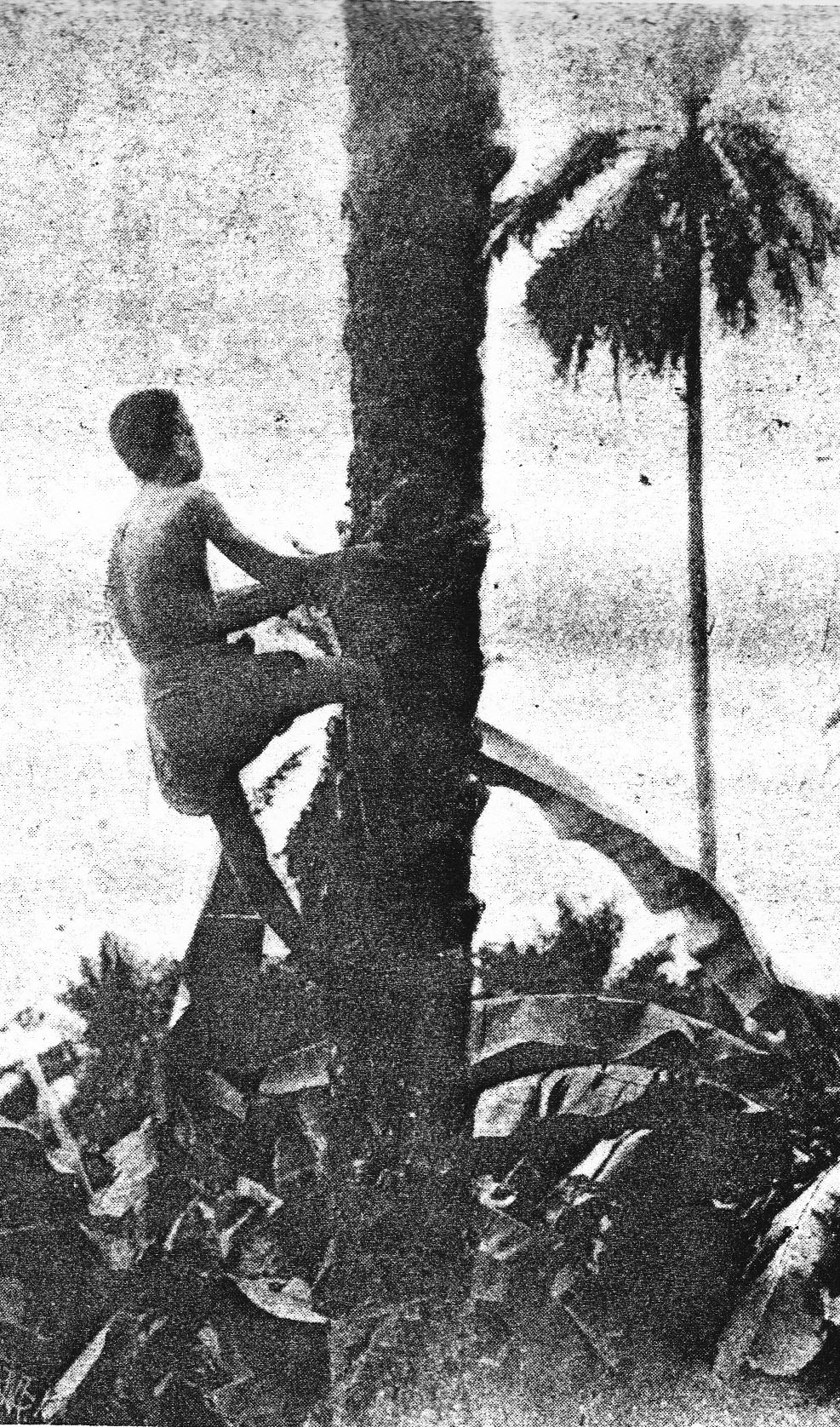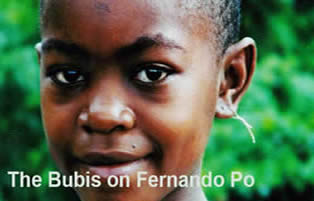 A Bubi man climbs a palm tree to cut clusters of fruit to make palm oil, which is used in cooking. (From The Bubis on Fernando Po)
A Bubi man climbs a palm tree to cut clusters of fruit to make palm oil, which is used in cooking. (From The Bubis on Fernando Po)
Chapter 21: Social scale
Among the Bubis there exists, the same as in all countries of the world, distinct social classes. The Bubis are free people and do not recognize slavery in its most strict form, which they call bopippi, bopibbi, bopimbi. But they do recognize a moderate and benign form of servitude, to which they give the name botaki or motaki. There exists, moreover, baita and babale, which mean nobles and plebeians; and batuku and bataki, or masters and servants. Nobility is based solely on birth.
The legitimate children of the baita are equally baita, but not their natural or illegitimate children. A boita can marry with a bobalari woman, and the children born of such a marriage belong to the category of the father. If the mother and the father are both baita, the children are doubly baita and are called bolaita.
The premier boita or moita has his court (ritaka or rijata) in the heights of Riappa or Biapa. He receives the titles etakio ote or grand chief, motuku m’oricho, lord of the world, and motuku moa batuku, master of masters or lord of lords. The batuku of the district are distinguished by the region, as botuku bo Isupú, motuku mo Elachá, mochuku mo Motehe, etc.: “chief of Basupú, de Balacha, de Batete,” etc.
All of the baita of the district are natural-born counselors of the botuku bo che or chief of their own district. The general assembly is given the name of njuha. Some have other honorary titles, such as ebohoanna (N), ebohoabí (S). To obtain these titles one is required to have killed an enemy in a just war, and, further, to have five spouses ebiôtô, or legitimate. The women of a man among themselves call one another bonki (plural); banki (N); bohiki mohiki (plural); bahiki (S).
For someone to become chief of a district or motuku mo che, it is necessary that he be rich in goat livestock, in Bubi money, in palm oil, and that during five consecutive years he has sewn four thousand yams. In possessing such requisites, the custom and culture state clearly that he must celebrate an important rite and celebration. The first, called loha, consists in the aspirant being obliged to dress as Adam in Paradise, remain secluded in his house for six days, and give to the district’s chief five goats or their price in Bubi money. This equals about one hundred rionehila (N), meiha (S). A rionehila, moiko, or riki equals a peseta.
In some district they require a twelve-day stay in the house and a tribute of twenty goats, or their equivalent. During his seclusion, he must sacrifice a goat to the ancestors or deceased of the family every two days. In the meantime, the eldest women of the village, forming a circle facing the aspirant’s house, sing canticles and hymns of praise and cordial joy, celebrating such a fortunate occurrence. At the conclusion of the aforementioned formalities, he has the right to be called eboho, and if the aspirant is a moitari, he is not given the title of eboho, but of koobe. I have only known five women who possess the title of koobe: a botukuari of Basupri, Sese of Musola, Mehechi of Balacha, Sibeto of Batete, and Adelaida Yala, of Chema.
Bubi law prohibits two persons of different categories or ranks to eat together. Thus, it is not legal for a wife to eat with her husband, a bobala with a boita, eboho, or koobe. This latter must always eat alone, unless other eboho or koobe visit them.
Some districts have other titles, such as ebiaso ota paho, which means invincible lord. In others they say eloola, which indicates respect, or respectable lord, such as eloola lo booba, lord of the earth.
The chiefs of a district, etaka or ejata, have their ministers and officials. The first of these has the name of mpo. His obligations are first, to accompany the botuku wherever he goes; second, to be the botako or motako, ambassador or messenger in all the concerns or business among one and another chiefs; third, to perform the office of the majordomo of the palace; forth, appoint and fill the rohi ra balakobias, the teams or companies of workers and other employees.
The second minister was the sheriff, whom they named tchoko o botuku or noko o mochuku, which means literally the eyes of the master; and the third was the whip or “knife of the master,” looba lo botuku.
In regard to the legitimate spouses (biôtô), they did not enjoy identical favors. The most beloved boarijorò was the uri, or principal lady, and she was not in the habit of working. She was followed by borenna or boareña, who held the office of head housekeeper and accompanied the chief on his trips. Third was the bolôbô or molôbô, who prepared and administered the chief’s food and held up the plate while he was eating. The concubines or bari be rijole, were required to help the others in their domestic housework and in their field work.
The baitari who enjoyed the treatment of koobe ordinarily were very old widows. They lived with men and women servants who fulfilled all their commands. They were venerated and respected, and all district inhabitants were obligated to clear for them, annually, a piece of land for yams, plant it, cultivate it, harvest it and store its fruit, and attend to them in all their needs. Thus were obtained all the comforts that can appeal to an old, savage woman.
Some of them are, or were, very rich in yams and heads of goats, and that is clear to me by what happened in Batete. In 1903, the muchukuari Sibelo died in Riobanda of Batete. She bequeathed in her will half of her harvest of yams that year to the mission, ordering the servitude to surrender themselves to the superior of the mission. They brought a large quantity of yams, the smallest ones weighing nearly five pounds each. This old woman, according to what the old ones told me, was a prophetess, or sibyl, for many years before the establishment of the Batete mission. When no one could guess such an establishment was possible, she assured an assembly of notables in the region that, in a short while, some white men would take up residence in Batete who would teach new laws and customs quite contrary to theirs, and that the cult of the barimó of Batete would vanish once and for all.
She saw part of her prophecy carried out. However, she herself always maintained distance from the mission, avoiding all dealings with it without making herself the enemy — neither hiding, nor openly making war.
In the dry season of 1901, the superior of the Riobanda mission settlements visited her. When he arrived at the avenue of trees that gave entrance to her palace or ritaka, she went out to meet him, accompanied by two maids of honor. As she came forward to meet him, she was eating a leg of roasted antelope. The Father greeted her in Bubi and she responded amiably, then stretched the leg out for the Father to take some bites. His first reaction was repulsion, but considering that its rejection would disdain and rebuff her, he plucked up his courage, took it, and in the most intact part took two bites. The woman was satisfied and complacent, and, smiling at him, said: Bue a mobube moèttè. “You are a true Bubi.”
From this date forward she demonstrated much fondness and affection for the mission. She came to visit the Father in the mission house, whose threshold she had never crossed, though it had been built more than forty years ago. Upon her death, she advised her servants to leave the forest and settle themselves
in the mission, and a large part of them followed her advice. Nonetheless, in spite of everything, she died an infidel for fear of the baita.
Of the babala, there are those who are quite rich in yams, palm oil, and heads of goat. If they sell them, they have notable quantities of Bubi money and, once they have the equivalent of seven hundred pesetas, it is possible to buy the title of mochuku from the district’s chief. After receiving his payment, the chief fastens a tie made of sheep beards around the neck of the postulant and, with this simple ceremony, he is made mochuku. From now on, he will have the treatment of ebieri.
Among the babala there are different classes: balakó biao, this is laborers; babeba or babema, hunters; boobe or boome, fishermen; rieba or riema, winemakers; and bisoko, fishmongers. These have the treatment of ealobá in the southern districts.
